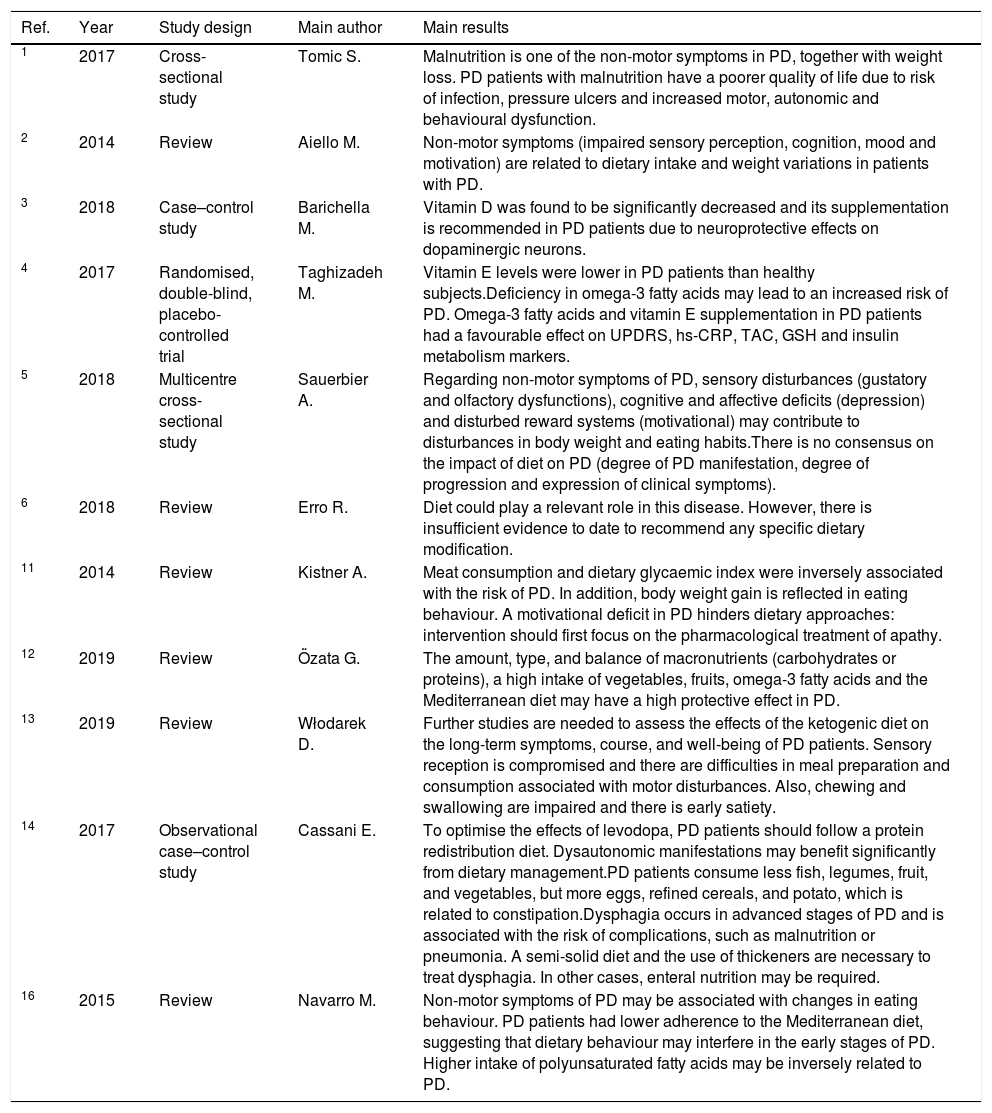Parkinson's disease (PD) is a neurodegenerative disease that is characterized by the loss of dopaminergic neurons and a dopamine deficit. The symptomatology associated with PD is diverse. The clinical manifestations of patients include motor and non-motor symptoms. One of the non-motor symptoms is weight loss and a high risk of malnutrition. It is important to consult neurology regarding the diagnosis and follow-up of patients with PD.
ObjectiveTo show the relationship between dietary habits and signs and symptoms in Parkinson disease.
MethodThe methodology used consisted of a systematic review of narrative analysis on the relationship between food and the symptoms associated with PD. The databases consulted through the critical reading programme (critical appraisal skills programme, Spanish) were: MedLine, Web of Science, Scopus and PubMed. Among the inclusion criteria: studies in Spanish and English were accepted. The time range was from 2014 to 2019. The search terms used were: “Parkinson's Disease”, “Healthy Diet”, “Feeding Behaviour” and “Signs and Symptoms”.
ResultsA total of 85 published study documents were identified, of which 8 met the inclusion criteria. Three documents were included from the literature review of grey literature and 11 selected documents were analysed.
Approximately 60% of patients with PD suffer from constipation. A high fibre diet and proper hydration are essential. Modified texture diets are the first strategic line in the management of dysphagia and will have to be considered in the treatment of PD. Vitamin D intake was found to be decreased and supplementation should be considered. Other non-motor symptoms in early stages, such as depression and hyposmia, may affect dietary choices and be responsible for the observed nutritional status decline.
ConclusionsNutritional care should be considered as an integral part of the treatment of patients with PD, because the nutritional status of patients with PD is a relevant component of their quality of life. In addition, malnourished patients with PD suffer more pronounced motor symptoms and a more advanced status of PD.
La enfermedad de Parkinson (EP) es una enfermedad neurodegenerativa que se caracteriza por la pérdida de neuronas dopaminérgicas y por un déficit de dopamina. La sintomatología asociada a la EP es diversa. Las manifestaciones clínicas de los pacientes incluyen síntomas motores y no motores. Uno de los síntomas no motores es la pérdida de peso y un alto riesgo de desnutrición. Es importante la consulta de neurología respecto al diagnóstico y seguimiento de los pacientes con EP.
ObjetivoMostrar la relación entre la alimentación y la sintomatología asociada a la enfermedad de Parkinson.
MétodoLa metodología utilizada ha consistido en una revisión sistemática de análisis narrativo sobre la relación entre la alimentación y la sintomatología asociada a la EP. Las bases de datos consultadas mediante el programa de lectura crítica (critical appraisal skills programme español) han sido: MedLine, Web of Science, Scopus y PubMed. Entre los criterios de inclusión: se admitieron estudios en castellano e inglés. El rango temporal fue desde 2014 hasta 2019. Los términos de búsqueda usados fueron: «Enfermedad de Parkinson», «Dieta Saludable», «Conducta Alimentaria» y «Signos y Síntomas».
ResultadosSe identificaron un total de 85 documentos de estudios publicados, de los cuales 8 cumplieron con los criterios de inclusión. Se incluyeron 3 documentos a partir de revisión bibliográfica de literatura gris y se analizaron 11 documentos seleccionados.
Aproximadamente un 60% de los pacientes con EP padecen estreñimiento. La dieta rica en fibra y la correcta hidratación son esenciales. Las dietas de texturas modificadas son la primera línea estratégica en el manejo de la disfagia y tendrán que considerarse en el tratamiento de la EP. La ingesta de vitamina D se encontró disminuida y se tendría que considerar su suplementación. Otros síntomas no motores en etapas tempranas, como depresión e hiposmia, pueden afectar a las elecciones dietéticas y ser responsables del deterioro del estado nutricional observado.
ConclusionesEl cuidado nutricional tendría que estar considerado como parte integral del tratamiento de pacientes con EP, ya que el estado nutricional de los pacientes con EP es un componente relevante de su calidad de vida. Además, los pacientes con EP desnutridos padecen síntomas motores más pronunciados y un estado de EP más avanzado.
Artículo
Diríjase al área privada de socios de la web de la SEDENE, (https://sedene.com/revista-de-sedene/ ) y autentifíquese.
Comprando el artículo el PDF del mismo podrá ser descargado
Precio 19,34 €
Comprar ahora






